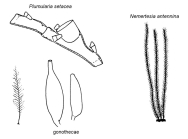WoRMS taxon details
Plumulariidae McCrady, 1859
1613 (urn:lsid:marinespecies.org:taxname:1613)
accepted
Family
Plumularidae McCrady, 1859 · unaccepted > misspelling - incorrect original spelling (incorrect name formation)
- Genus Antomma Stechow, 1919
- Genus Callicarpa Fewkes, 1881
- Genus Cladacanthella Calder, 1997
- Genus Dentitheca Stechow, 1920
- Genus Hippurella Allman, 1877
- Genus Monotheca Nutting, 1900
- Genus Nemertesia Lamouroux, 1812
- Genus Plumularia Lamarck, 1816
- Genus Pseudoplumaria Ramil & Vervoort, 1992
- Genus Schizoplumularia Ansín Agís, Ramil & Calder, 2016
- Genus Sciurella Allman, 1883
- Genus Sibogella Billard, 1911
- Genus Acanthella Allman, 1883 accepted as Cladacanthella Calder, 1997 (invalid junior homonym of Acanthella Schmidt, 1862 [Porifera], )
- Genus Antennopsis Allman, 1877 accepted as Nemertesia Lamouroux, 1812 (unaccepted > junior subjective synonym, synonym)
- Genus Antennularia Lamarck, 1816 accepted as Nemertesia Lamouroux, 1812
- Genus Heterotheca Stechow, 1921 accepted as Plumularia Lamarck, 1816 (unaccepted > junior subjective synonym)
- Genus Lowenia Meneghini, 1843 accepted as Plumularia Lamarck, 1816 (synonym)
- Genus Monothecella Stechow, 1923 accepted as Plumularia Lamarck, 1816 (synonym)
- Genus Nemertella Stechow, 1923 accepted as Nemertesia Lamouroux, 1812 (unaccepted > junior subjective synonym)
- Genus Polynemertesia Broch, 1918 accepted as Polyplumaria Sars, 1874
- Genus Polyplumularia Sars, 1874 accepted as Polyplumaria Sars, 1874 (unaccepted > misspelling - incorrect subsequent spelling)
- Genus Sphaerocystis Fraser, 1943 accepted as Dentitheca Stechow, 1920
- Genus Stechowia Nutting, 1927 accepted as Sibogella Billard, 1911
marine, fresh, terrestrial
(of Plumularidae McCrady, 1859) McCrady, J. 1859. Gymnopthalmata of Charleston Harbor. Proceedings of the Elliott Society of Natural History 1: 103-221, pls 8-12. , available online at https://www.biodiversitylibrary.org/page/42536587
page(s): 198 [details]
page(s): 198 [details]
Schuchert, P. (2024). World Hydrozoa Database. Plumulariidae McCrady, 1859. Accessed through: World Register of Marine Species at: https://www.marinespecies.org/aphia.php?p=taxdetails&id=1613 on 2024-11-21
Date
action
by
2004-12-21 15:54:05Z
created
db_admin
![]() The webpage text is licensed under a Creative Commons Attribution 4.0 License
The webpage text is licensed under a Creative Commons Attribution 4.0 License
original description
(of Plumularidae McCrady, 1859) McCrady, J. 1859. Gymnopthalmata of Charleston Harbor. Proceedings of the Elliott Society of Natural History 1: 103-221, pls 8-12. , available online at https://www.biodiversitylibrary.org/page/42536587
page(s): 198 [details]
taxonomy source Hincks, Th., 1868. A history of the British hydroid zoophytes.London, John van Voorst. Volume 1 : i-lxviii + 1-338, volume 2: pls 1-67., available online at https://www.biodiversitylibrary.org/page/46798707
page(s): 279, emended spelling [details]
context source (Hexacorallia) Fautin, Daphne G. (2013). Hexacorallians of the World. (look up in IMIS) [details]
basis of record Calder D.R. (1997). Shallow-water hydroids of Bermuda: superfamily Plumularioidea. <em>Royal Ontario Museum Life Sciences Contributions.</em> 161: 1-86.
page(s): 8 [details]
page(s): 198 [details]
taxonomy source Hincks, Th., 1868. A history of the British hydroid zoophytes.London, John van Voorst. Volume 1 : i-lxviii + 1-338, volume 2: pls 1-67., available online at https://www.biodiversitylibrary.org/page/46798707
page(s): 279, emended spelling [details]
context source (Hexacorallia) Fautin, Daphne G. (2013). Hexacorallians of the World. (look up in IMIS) [details]
basis of record Calder D.R. (1997). Shallow-water hydroids of Bermuda: superfamily Plumularioidea. <em>Royal Ontario Museum Life Sciences Contributions.</em> 161: 1-86.
page(s): 8 [details]
 Present
Present  Inaccurate
Inaccurate  Introduced: alien
Introduced: alien  Containing type locality
Containing type locality
From editor or global species database
Diagnosis Colonies erect, monosiphonic or polysiphonic, arising from creeping, rootlike, or disc-shaped hydrorhiza; hydrocauli branched or unbranched, hydrocladia alternate, opposite or in verticils, arising in polysiphonic hydrocauli from a single axial tube; hydrothecae typically small, uniseriate, usually at least partially adnate, occurring only on hydrocladia, with or without marginal cusps; nematophores with well developed nematothecae, not as naked sarcostyles; all nematothecae (axillar, cauline or hydrothecal) usually two-chambered (bithalamic) and movable, a minimum of three nematothecae adjacent to hydrothecae, one mesial inferior and a pair of lateral ones; gonophores as fixed sporosacs, exceptionally as swimming gonophores; gonothecae solitary, without nematothecae; with or without phylactocarps. [details]Spelling Spelling by Agassiz (1862: 358) was Plumularidae, Hincks (1868) introduced the correct spelling Plumulariidae. [details]

